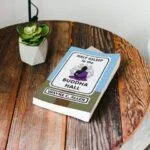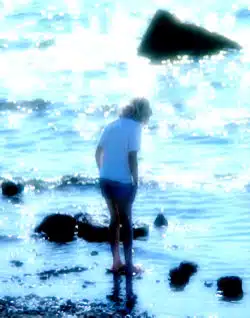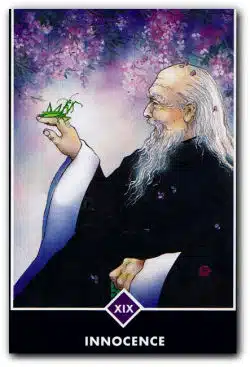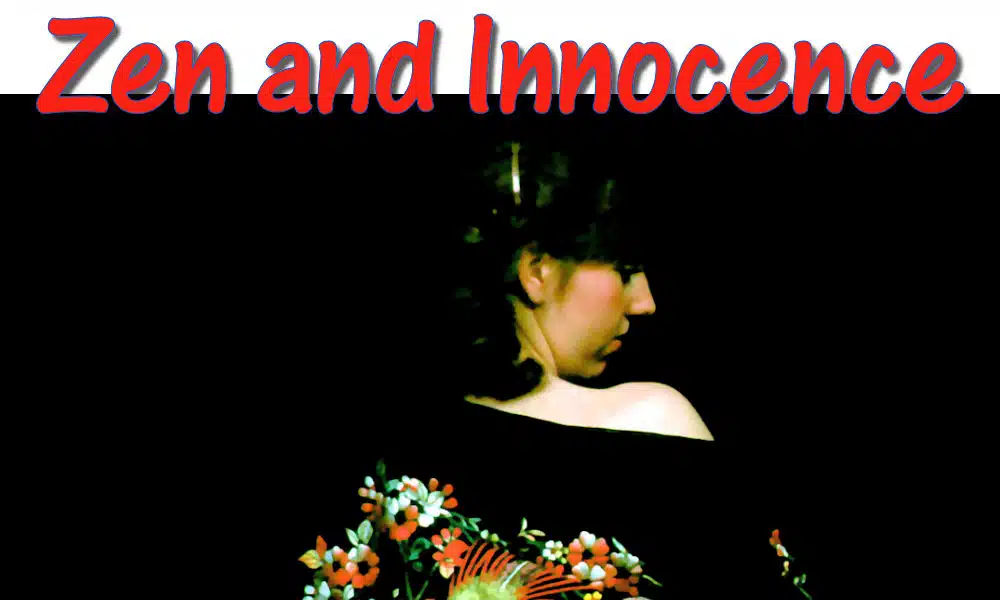Zen and Innocence — finding a place of childlike innocence allows us to interact with life, rather than analyze it.

Looking for more on this topic?
Check out my book, Half Asleep in the Buddha Hall.
Wayne’s “Eastern” book takes you by the hand and helps you to find peace of mind. Half Asleep in the Buddha Hall is a Zen-based guide to living life fully and deeply.
There’s this thing about Zen: it flies in the face of conventional “wisdom.”
For example many are the stories of Zen masters, in the middle of life-threatening situations — stopping to admire (or eat!) a strawberry. Here’s one version:
One day while walking through the wilderness a man stumbled upon a vicious tiger. He ran but soon came to the edge of a high cliff. Desperate to save himself, he climbed down a vine and dangled over the fatal precipice. As he hung there, two mice (one black, one white) appeared from a hole in the cliff and began gnawing on the vine. Suddenly, he noticed on the vine a plump wild strawberry. He plucked it and popped it in his mouth. It was incredibly delicious!
The western concepts of “urgency and importance” are disturbed by a story such as this. How can it be, in the midst of this serious situation (Tigers! Oh! My!) that he would eat (and enjoy!) the strawberry? And yet…
Remembering and using the skill of coming to a full stop is a useful way to approach our lives differently.

A friend recently mentioned watching his three-year-old child. Right in the middle of something, the child would do a “full stop;” she would freeze in place, her eyes would glaze over, and then, a second or two later, she’d snap back to “here,” and carry on.
My friend decided that the child was making a new neurological connection.
Of course, this is how children do behave.
None of us remember being a young child. We do not remember being born into a world about which we had no clue — we were born as tabula rasa — blank slates. We were born as receivers. Our sense organs were open to some degree (for example, it takes months for a baby’s eyes to truly focus) and our brains were empty sponges.
We began to add in data — but it was raw data. It lacked meaning. Data flows in and initially — perhaps for three or four years — much or all of this data is new – or better, being experienced by the child for the first time.
So, the child must turn to adults for interpretation.
Remember, the child has no context (prior experience) to judge a new experience. Context develops over time. So the parent I described above is correct; his child was “zoning out” in order to categorize. The “zoning out,” was the child turning off external stimulation to make a neural connection regarding a new experience.
But what the experience means is up for grabs.
To repeat, meaning is initially provided by adults. As children, we learn what others believe to be so, and because we, as children, have no innate beliefs. So, we buy into the belief system of our “tribes.”
Because nothing predates this tribal interpretation, it becomes our deeply rooted belief system. Everything, from then on, is vetted through — and attached to — this primary belief system. This happens without exploring the truth of the initial belief(s). We believe our foundational truths are true… because we believe them to be true.
These baseline beliefs are not based upon evidence.
They are based upon … well … nothing! Weirdly, most people never examine these beliefs — they go through life filtering their ongoing reality through un-examined beliefs.
For this reason, Buddha (might have) said,
“Do not believe in anything simply because you have heard it. Do not believe in anything simply because it is spoken and rumored by many. Do not believe in anything simply because it is found written in your religious books. Do not believe in anything merely on the authority of your teachers and elders. Do not believe in traditions because they have been handed down for many generations. But after observation and analysis, when you find that anything agrees with reason and is conducive to the good and benefit of one and all, then accept it and live up to it.”
Let’s revisit this: What the Buddha suggested is not what most adults do. Most have never questioned their baseline beliefs.
And then, to complicate matters, we think that what we believe is also true. We believe it so fervently that, even though what we believe leads to suffering and pain for ourselves and others, we still believe it and do it.
It’s as if our heads harden at age five, and that’s it. “Here is who and what and how I am, and there is nothing I can do about it!”
Well, yes, there is an alternative, although it is difficult.
It is called adopting a practice of innocence.
Innocence comes in two flavours: You have seen children running off in all directions. They are doing that because they crave new experiences. They know that the only way to learn new things is to have new experiences. They have not (yet!!) shut off their curiosity. They rush ahead, and damn the consequences.
This is a description childish innocence. It is reckless, and lacks reason.
Child-like innocence, on the other hand, happens when a reasoning and functional adult explores the world (inner and outer) with complete openness and total freedom.
The freedom of child-like innocence is freedom from prejudice.
Prejudice simply means “pre-judgment.” It is believing that I already know what something means, what it will feel like, what will happen, how someone “always is.” It is a load of crap, but we believe it. Prejudice keeps us from experiencing life in with child-like innocence.

The monk in this card from the Osho Zen Tarot deck is demonstrating what I am talking about. He is totally engaged with the praying mantis on his finger. He is fully and deeply present in the moment, without prejudice.
And, he is clearly happy.
One mark of the state of innocence and bliss is a smile. It is getting the joke that my life is what I make of it, and is precisely how I define it. In innocence, my experiences are devoid of meaning, (until I add them,) and there is no requirement that I do so!
I can “be” in my experience.
And the joke is, you are in your experience, whether you notice or not. This is the Zen of today’s article. You cannot escape your experience. Torturing yourself and suffering over your experience is a function of judgment and prejudice, and it entirely optional.
I am “in” my experience; if I am also awake to it, then whatever is going on is simply what is going on.
Life is incredibly short, and much of it is wasted in endless justifications for staying stuck in old thought patterns and habits. The old, old stuff is not removable. It’s just there. But, and here’s the key, it can be dealt with.
For instance, when you were four, there likely was an absolute rule that you were never, ever, to cross a street without holding an adult’s hand. I trust you’ve moved past that rule by now! Yet, that “life or death” rule is still in there, and likely no one ever told you specifically to disregard it. You outgrew it.
It is now time to outgrow all the stuff you shovel that keeps you stuck and miserable.
Not by rooting it out or by getting someone’s permission to let it go. You outgrow it by acting in another way. Metaphorically, it is now up to you to look both ways before crossing, but to cross the damn street!
Growing up means letting go of childish things. Letting go of what is not working, by doing what does work. Having experiences because they are available to you. Having full body relationships because you want to. Having new thoughts and new experiences each and every moment. And this is only possible by being in the moment (you are anyway!) with attention and focus.
Do it, now. And enjoy the adventure! Even with tigers above and tigers below, the strawberry at hand is delicious!
